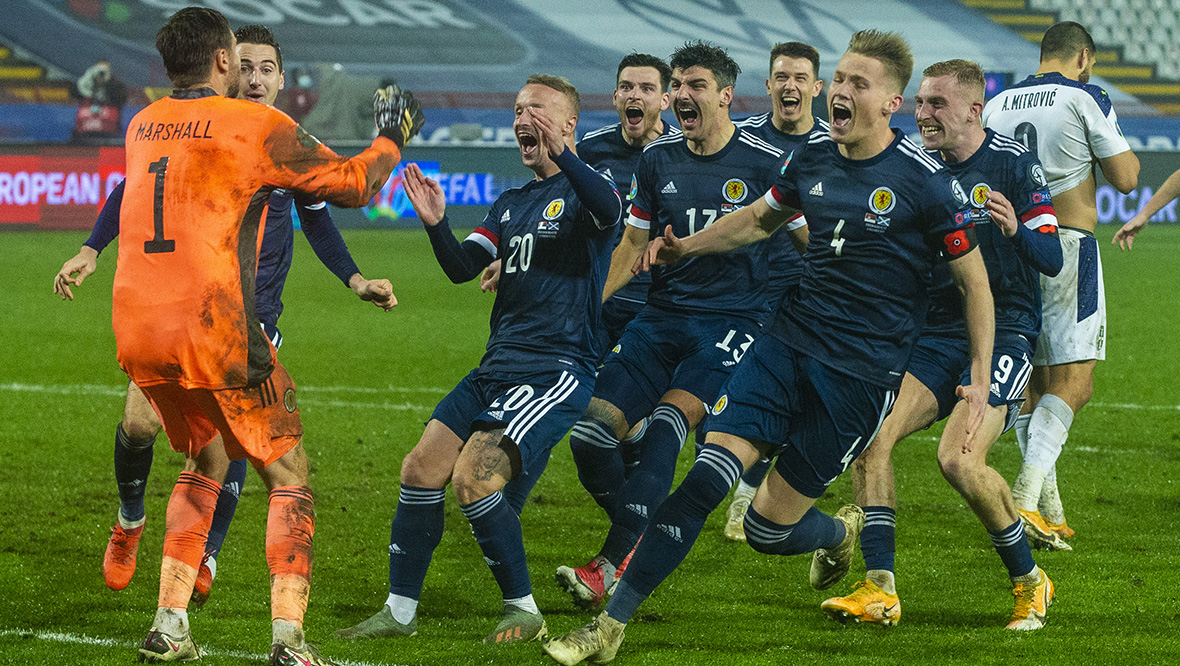Scotland face Armenia on Wednesday at the start of a new campaign.
The wound from Ukraine’s play-off semi-final win, and the end of World Cup dreams, may still be fresh but Steve Clarke and his Scotland players have to lift themselves for the next challenge.
Just a week after the dismal defeat at Hampden that extinguished all hope of Qatar 2022 qualification, attention turns to the next major tournament.
The international match is the first of the 2022 Nations League and, as always, the competition has plenty to offer, despite not being as high-profile as the World Cup or Euros.
The Nations League was designed to curb the number of international friendlies, but also aimed to bring more genuinely competitive games to the calendar.
The tournament is designed to pit teams against others at roughly the same level, with promotion and relegation through the four tiers, in theory allowing everyone to find their level.
Scotland’s level right now is outside the elite, in League B, after the last edition saw the team finish behind Czech Republic by two points, but ahead of Israel and Slovakia. No movement up or down for the latest round of games, but fresh opposition.
Who will Scotland play?

The draw put Scotland up against Armenia, Republic of Ireland, and Ukraine, with the trio sure to pose different tests for Clarke and his squad.
As the team that dropped down from League A, Ukraine are the big hitters and favourites to earn promotion back to the top tier.
Scotland already know what the war-torn nation can produce on their day, having suffered defeat last week in the play-offs, but both games against Ukraine will now take place in September.
June’s international break brings home and away games against Armenia, with a trip to Dublin to face Ireland in between.
The group starts with what is theoretically the easiest game, at home to an Armenia side who were in League C last time, before an intriguing trip to Republic of Ireland, who Scotland last played in a 1-1 draw in 2015.
What happens if Scotland win the group?

Winning the group would secure promotion for Scotland, first and foremost.
Topping group B1 would mean that in the next Nations League, Scotland would be up against the best sides in Europe. That would mean plenty of glamour games and regular tests against stronger sides.
The biggest reward on offer, though, is what the Nations League means for other competitions.
In the last two qualification campaigns – Euro 2020 and Qatar 2022 – the group winners have secured a play-off place to compete for one of the last spots at a finals. It only kicks in if the nation fails to qualify via the traditional means, but it’s a hugely valuable card to hold.
Scotland’s appearance at the last Euros, ending a 23-year wait for a major finals, came about precisely through that route, with Clarke leading the team to play-off wins over Israel and Serbia.
UEFA haven’t confirmed that the same format will apply this time round, but have said that three of the places at Germany 2024 will come from the Nations League group winners, suggesting that a repeat of the play-offs is on the cards.
The other benefit of winning the games is that it can help with the traditional route of qualifying. UEFA have stated that the draw seedings for the Euro 2024 qualifiers will be based on how teams finish in the 2022-23 Nations League.
The Euros qualifying starts next March, but the campaign effectively begins on Wednesday against Armenia if Scotland want to make sure the next major tournament is one we’re booking travel for, not watching from afar.
Follow STV News on WhatsApp
Scan the QR code on your mobile device for all the latest news from around the country


 SNS Group
SNS Group

























